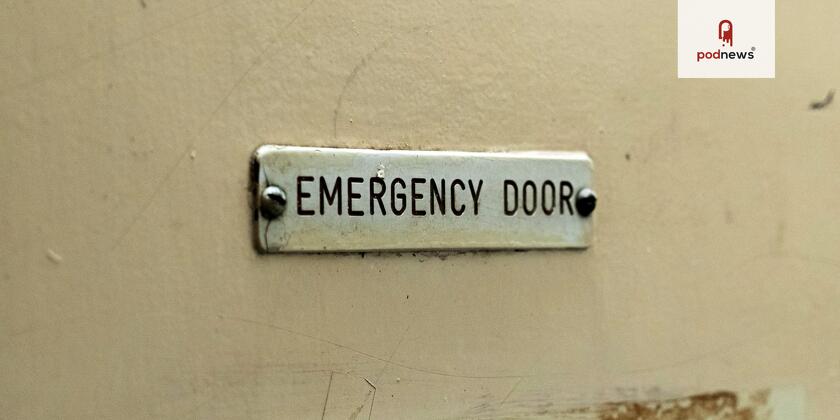
Make sure your podcast keeps going even if you can’t

Podcasting, like everything else in life, needs a complicated web of online accounts and passwords. But what happens if you’re suddenly unable to do your work yourself? Who else has access to your podcast account, your website and your computer?
If you’re suddenly taken seriously ill, or worse, you can make life much easier for others if you make it easy for them to access your accounts - rather than lose access to your life’s work.
Things are stressful enough for people trying to look after your stuff, without them struggling to gain access to it in the first place.
Here’s what we’d recommend.
Invite someone you trust as a team member
Most podcast hosting companies allow you to invite “team members” to also administer your show. For every one of the shows you do, make sure that you’ve chosen someone and invite them to be part of your project. Here’s advice on that at Apple Podcasts Connect, Spotify, Buzzsprout, RSS.com, Transistor and Captivate. Do this today.
If you also have other accounts to do with your podcast, like Podpage, Github or Wordpress, do the same with these, too.
This is the easiest way to, at least, ensure that your contributors or friends aren’t instantly locked out of publishing your podcast if you’re suddenly unable to maintain it.
But it isn’t the only thing to do.
Get a password manager
There are plenty of good password managers out there. Get one.
We’d recommend Bitwarden, which is free for most things (and is $10 a year for everything). It’s open, works on everything, and you can access everything on apps and through a web browser - so they’ll not need to access your devices to get access to your passwords. (This isn’t an affiliate link - it’s just a tool we’ve used for a number of years.)
Use it
Set your main password manager to be this one: and use it. Make sure all your passwords are in there; set up the keyboard shortcuts to fill in your passwords.
A password manager is only useful if you use it all the time.
List all the passwords clearly
Make sure it’s got your main podcast accounts, banking details, and other important things in it, and that they’re easy to find.
Don’t store your Buzzsprout password under “Buzzsprout” - store it under “Podcast host: Buzzsprout”, for example, so it’s easy to search for. While you know who hosts your podcast, whoever gets access to your password manager won’t - so make it as easy as you can for them.
Help people access it
First, if you’re using Bitwarden as we suggested, set up Bitwarden Emergency Access, so your emergency contact can access your passwords.
But, even if you’ve done that - write a little document that helps someone access your password manager. (Remember that whoever reads it might not be very tech literate, so make it as easy as possible).
The way we’d do this is to write the document on your computer, but hand-write the master password. That means that even if someone hacks into your computer and finds this file, they still won’t be able to discover your master password.
Many password managers can be set to require a physical key to log in on a new machine for the first time. This is great for security, since it means you need to have something physical in order to get in. If that’s the case for you (and we’d recommend it), write down where to find your spare physical key. (“It’s on my keyring” is of no help if your keyring was in your pocket when you were on that submarine, you billionaire, you - so make sure you have a spare that works, perhaps stored in the cutlery drawer of your butler’s quarters in your third home).
You might also want to write down the PIN code that gets into your phone; and the password that gets into your laptop.
When you’ve written the document, print it out, write the passwords on it, and make sure that you can access your password manager with only the information you’ve put on the document. Then, we’d suggest putting it in a sealed, clearly marked envelope, and tell people where you’re putting it - in an obvious place where people will find it. (With your will?)
Add a “legacy contact” for your accounts
Apple has a “legacy contact” so you can share with them the data in your Apple Account after death. Your Legacy Contact can be anyone you choose, and you can designate more than one. They don’t even need an Apple Account or an Apple device. They will, though, need your death certificate.
Google has an Inactive Account Manager, which will automatically give the keys to your account to whoever you nominate (up to ten people) after at least three months of inactivity. This is no good for keeping your podcast going: but it will be very helpful for many other things.
Get a will
Making a will is the only way you can ensure that when you die, your estate will be distributed according to your wishes. And that includes your podcast business, and everything that goes with it. In most countries, if you don’t have a will then the government gets involved, and while we’re sure that at that point you won’t care, your loved ones certainly will.
The law around what makes a legal will differs by state and by country. In most cases it’s very cheap if not free to do.
Other things to read
Gordon Firemark is a US-based lawyer who has covered this in some detail (for folks in the US) in this episode:
For folks in the US and Canada, there’s an app called Empathy that can help with the nuts and bolts of dealing with loss. It comes recommended from those who have used it.


































































































